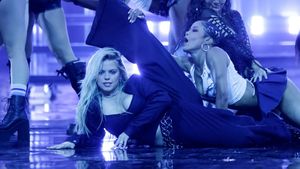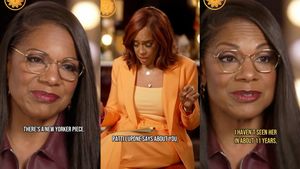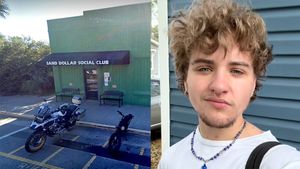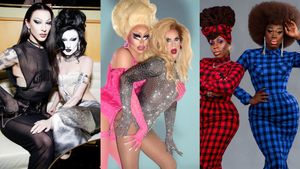With its folksy, funny, and sometimes heartbreaking
vignettes of everyday existence, radio program This
American Life--produced by Chicago Public Radio and
widely heard on National Public Radio--has
captivated listeners for over a decade. Now host
Ira Glass brings the program to Showtime, and talks
to The Advocate about everything from crazed
fans to Tyra Banks.
Hey, Ira. I just saw the whole series and I loved it.
Oh, thank you.
How much self-analyzing went into bringing the
radio show to TV? Was there a lot of inner turmoil?
[The This American Life staff and I] believed it
would be impossible to do more self-analyzing than we
did. I feel like the staff and I took it as far as we
could possibly go because there was a long period where
Showtime was asking us to do [the TV show] and we
simply weren't sure it could be done at all. Once we
started working on the pilot, there was the incredibly
horrible process of figuring out the aesthetic of this thing
we were inventing. In the beginning we talked about doing a
lot of animation and a lot of fancy stuff, but in the
end we felt like that stuff wasn't as expressive for
what we wanted to do. In the end you want to come
to solutions that are simple.
Do you have a stock response that you keep
handy for the people who think you sold out by bringing
This American Life to TV?
I really need one, don't I? I mean, people
aren't saying to me, "You sold out." It's more like
people, the fans of ours, don't understand. It's total
incomprehension. It doesn't go as far as selling out.
Sometimes there's a feeling of betrayal because I think
there are still people who view anything to do with
television as just being bad. I feel that's a little
out of date, truthfully. Television has gotten so much
better in the last 10 years. But I think that still, for
many people, if it's television, that means it's a
force of evil. So when I'm getting this incredibly
skeptical response from our own fans, the thing I've been
saying is that we did this because we thought we could make
a nice show. We didn't do [the TV show] wanting to do
anything different. We thought we could make a show
that has exactly the feeling and the values of our
radio show. And it seemed worth trying.
So no nefarious reasons.
There's no dignity in saying this, but the radio show
had been on the air for over a decade, and it just
seemed like it would be fun to try something new. It
wasn't more complicated than that. We knew that we
weren't going to stop making the radio show, and it just
seemed like, well, we have this TV network that wants
to throw all this money not at us but at this project.
When do you get a chance like that? When we were doing
the pilot, we got all sorts of guarantees from the network,
like if we did the pilot and we found that the things
they needed for it to be a TV show were simply things
we didn't agree with, we could kill the whole project.
That's a lot of control.
In the end, they basically said, if we were going to be
unhappy with it, chances are they were going to be
unhappy with it too.
Do you believe the TV show packs the same punch as
the radio show?
If I didn't think that, we wouldn't be doing it.
The thing I would say to the radio listeners is, just
look at the preview online. I feel like once people
see that stuff they feel much more confident. We just did
this six-city tour, and I would say to the audience,
"Were you worried when you heard we were doing a TV
show?" In every city they roared back, "Yes!" In
Minnesota a guy yelled out, "Judas!"
The people in them all start out a little silly,
but by the end you've give them credence and the
audience is no longer judging them. How do you
manage to tell the stories without being
condescending? Is it in the stories you choose?
I don't think it's the stories we choose as much
as it is our general sense of aesthetics. I don't
think it's that interesting to laugh at people.
Stories are more interesting if you're empathizing. As soon
as you start empathizing, basically you've opened up
the entire world of feelings that are possible to have
as a person. If you're laughing at somebody, that's a
feeling, but it's a very finite feeling. I don't knock
reality shows. I watch those shows. I just feel like it's
human drama, and it's interesting, but that's not our
way.
I don't think people would be screaming "Judas" if
there was aTemptation Island 3.
Even with a pretty good show like Project
Runway there's a certain amount of laughing at a certain
character because they're just an ass. Runway
gets great when there is someone you really love and
you want to win. Of course you feel this about Tim
Gunn.
You opened yourself up to this. Are you watching Idol?
I should preface this by saying that everything
I watch on TV I watch just because my wife watches.
Anything that's her taste becomes my taste. I'm just a
sheep. That being said, I'm not watching Idol this
season. I stopped watching after the Fantasia season
because I loved her so much I didn't want to go through
that process with anyone else. I haven't sat through the
dance contest one yet.
You mean the one with Heather Mills, where her leg
is about to pop off at any moment? Top
Model is amusing beyond belief, though.
I know, I've seen a fair amount because of my
wife.
Back to reality, how do you come up with the This
American Life stories?
It's a combination of people bringing them to us
and stuff we go and find. Some things are just random
people who write though our Web site and pitch
something.
Do you hear certain pitches that you know would
work for the TV show and not the radio show, and vice versa?
Almost everything we hear is for the radio show and only
very rarely do we hear something that has as much
visual possibility for TV. If we get picked up for a
second season, it will be a drama to figure out what
the stories will be.
What's your favorite story on the TV show?
I would say it's the story about the 14-year-old who
decides he's never going to fall in love. What I like
about this story is that it's built around an
interview that's very much like the kinds of interviews
we do on the radio show, where the pleasure of the interview
is in a bunch of very small, often funny moments that
also reveal the kid's character. But then at the same
time, there are points where this story is carried by
the visuals. The visuals are the engine that run the story
in a bunch of different places.
Tell me about producer Christine Vachon's
influence on the show.
Christine is the reason the show exists. Showtime came
to us, and we said for this to happen you have to hook
us up with filmmakers, and they have to be people we
respect. Showtime came back, "How about Christine
Vachon?" We were like, "OK!" Everything they do at
Killer [Films] has such complete integrity and originality
and nerviness. We started this process is 2002, and
for years it didn't seem like it was going to go
anywhere. Christine was the reason, I think, that it finally
came to be. She's certainly one of the big reasons we got
through it. We needed somebody with a little clout to
help us say no to things. Christine was going to be
the person who was going to be the pit bull. I say
that as a pit bull owner, knowing that pit bulls are
actually very sweet. Christine and I went to college
together [at Brown University].
Now it's time for the fluffy questions. Do you ever
give thought to the fact that you're the thinking gay
guy's sex symbol?
I don't think I'm hot enough to be a gay man's sex
symbol. I live in Chelsea [in New York City] and
have gay friends. I am definitely not in shape enough.
If I wanted to sleep with a gay man, I think I'd have to
work out a little more.
Maybe if you moved to Williamsburg or Silver Lake,
you'd think differently.
It's incredibly flattering if that's true. Occasionally
when I'm giving a speech or on the radio and mention
that I have a wife, I'll get an e-mail from a gay man
saying, "Please, stop pretending. Who is this 'wife'
character you talk about?"
You must be able to sympathize with
straight celebs who are constantly being called gay.
I always feel like it's very flattering to be
included in that club. It's a group you'd like to be
part of.
On the show, your suits are pretty snazzy. Who's
the designer, and what do you wear when you do the radio show?
On the radio show I'm not quite as well-dressed
as on TV. For the TV show we got a stylist, and the
suits are John Varvatos. In real life when I pick a
suit for myself, I go more for the Paul Smith thing. I have
one incredibly beautiful Armani suit that has this
wonderful fabric. In real life I look like somebody
who has been working in public radio, which is to say,
not particularly well-dressed.
Now that you're on TV are you checking the mirror more?
I lost a lot of weight to do TV. I lost 30 pounds. It
wasn't because anybody asked me, it was just because I
knew I was going to be looking at pictures of myself,
and I didn't want to wince every time.
How did you do it?
I stopped eating starches and went to the gym every day.
Fear is a huge motivator; getting a network TV show
helped.
And where are the glasses from?
In the '90s I found a pair of glasses I could
stand. Actually I've gotten tired of these glasses and
have gone to look for others that I like as much,
and I just haven't found anything.
Sitting at the desk at the beginning of the show,
you're in front of a green screen, right?
No--the desk is everywhere we go. If you
look at the way it's photographed you can tell I'm
really there. I'm there on the side of a mountain in
Colorado.
Shut up. Where were you in the scene with the
billowing pillars of smoke behind you?
You're talking about the nuclear power station
in Pennsylvania. That's a day of my life, that shot.
It was incredibly cold. But as I've learned on
America's Next Top Model , sometimes when you're on camera you just have
to work through the cold.
Thank God for Tyra Banks.
Yes, thank God for Tyra.











































































